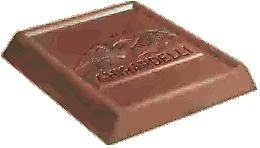February 16, 2005
Chocolate is bad good
 "Oh, no! Is this the last piece of my Valentine chocolate?" I told myself that surely I had not already devoured nearly the entire package of candy that I received on Saturday -- Well, I did share one piece. And after all, I had not eaten any chocolate in a long time. A recovering chocoholic, I finally reasoned that if I ate the last piece and did not buy any to replace it, I would be all right. Really, I would.
"Oh, no! Is this the last piece of my Valentine chocolate?" I told myself that surely I had not already devoured nearly the entire package of candy that I received on Saturday -- Well, I did share one piece. And after all, I had not eaten any chocolate in a long time. A recovering chocoholic, I finally reasoned that if I ate the last piece and did not buy any to replace it, I would be all right. Really, I would.
As I was savoring every bite of that exquisitely smooth and scrumptious confection, I continued to surf the net for interesting material to include in my next post. It was then that I ran across a blog post entitled "What's a Chocoholic to Do?" Assuming that it was written by a fellow blogger who had also just finished off her last piece of Valentine chocolate, I began reading. It was not at all what I had expected.
It seems that the cocoa beans used to make the candy that I had just enjoyed might have been harvested by child slaves on the Ivory Coast of Africa.
Few realize that most of the cocoa beans that go into Nestle, Mars and Hershey candy bars come from Ivory Coast, where thousands of enslaved boys — some as young as 9 — work in the most squalid, brutal conditions imaginable.From reading this post, it appeared that only if the "Fair Trade" label appears on a wrapper or box of chocolate can rest assured that its basic ingredient had not been gathered by these unfortunate, mistreated children.According to one report, the child slaves of Ivory Coast "are whipped, beaten and broken like horses to harvest the almond-sized beans that are made into chocolate treats for more fortunate children in Europe and the United States."
Frantically, I dug through the trash, looking for any packaging that I might have thrown away. Surely this company, which has prided itself on making the finest chocolate in the USA since 1852, has not contributed to the propagation of child abuse.
Finding no label, I went to the company's website. But all I could find was the history of chocolate -- which was actually quite interesting -- and further descriptions of the luscious stuff that I had just consumed.
Ghirardelli Dark Chocolate’s rich, legendary signature taste is created by a precise blend of deep-roasted cocoa beans and hand-selected ingredients. Deep, dark and decadent, this redefines chocolate indulgence.I then surfed on to the website of non-profit organization that grants companies the right to display the Fair Trade Label. Surprisingly, I found that Transfair USA (the official name of the organization) only began the process of certifying cocoa and chocolate in September 2002. In fact, these are the only brands of chocolate that have received the seal of approval from Transfair:
Nirvana Chocolates, Art Bars (Ithaca Fine Chocolates), Cocoa Camino, Coffee-Tea-Etc., Ltd., Dagoba Organic Chocolates, Divine Bars (Day Chocolate Company), Endangered Species Chocolate Company, E.B. Botanicals, Equal Exchange, Fair Trade Teas, Frontier Cooperative, Green & Black's (Maya Gold Bars), Green Mountain Coffee Roasters, Lake Champlain Chocolates, Nutraceutical Corporation (Fun Fresh Foods), Mont Blanc Gourmet, Omanhene Chocolate Co., Shaman Chocolates, Sojourn, Spruce Foods, Sweet Earth Organic Chocolates.I have heard of none of these brands, and I have no knowledge of whether the brands that I do know have even applied for certification.
The site also informs potential licensees of the certification process and offers additional forms to order fair trade labels, as well as DVDs, brochures, and posters about fair trade. There are announcements for jobs and for volunteer opportunities, as well as solicitations for donations. Also, since this organization also puts their stamp of approval on coffee, tea, and fresh fruit, there are announcements about food fairs featuring organic fruits and vegetables.
I finally decided that the lack of a label on my chocolate was not conclusive evidence that I helping to perpetuate child slavery.
That really was good chocolate. I refuse to feel guilty about something that I cannot prove. Please don't tell me that I should be. I won't listen.
Posted by Susan R at February 16, 2005 09:18 PMMoona,
I don't believe guilt is at issue in the fair trade discussion. More importantly, its a matter of awareness and action. I can't go into all the facts about cocoa and other equatorial commodities trade(you can check out http://www.ithacafinechocolates.com/aboutfairtrade.html or simple do a Google search), but I would encourage you to keep researching the issue and don't simply closet your concerns.
In an age of globalization, market forces drive public and international policy - including trade. Everyone must be aware of the resources we consume and how those decisions affect other people. Sometimes those we impact are our neighbors, sometimes they are on the other side of the world.
I hope the Fair Trade campaign does not make people feel guilty, but instead helps people be better informed and make decisions.
Besides, you never know, you may discover a new world of interesting boutique chocolates... of course, this could be dangerous for a recovering chocoholic : ) Be careful.
Thanks for your post.
Michael
Co-Founder, Ithaca Fine Chocolates.
